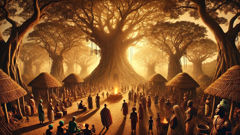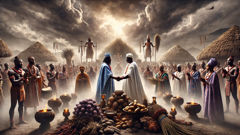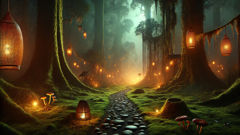Introduction
Long before the empires rose and fell along the Niger and the lush rainforests hummed with the bustle of kingdoms, the earth was wild and unfinished—a swirling chaos of water, wind, and formless land. In the midst of this primordial tumult, the Yoruba tell of a myth older than memory, when gods and spirits shaped destiny at their whim and mortals had yet to awaken. Among these tales, none is as foundational, as resonant, or as enduring as the epic of Oduduwa: the divine progenitor, the first Ooni, and the revered ancestor whose footsteps would echo across centuries, rooting a people in soil and story alike. The legend begins not on earth, but in the luminous heights of the Orun—the heavenly realm where Olodumare, the supreme creator, dwelled alongside a pantheon of orisha, each with their mysteries and mandates. There, Oduduwa gazed down upon the swirling waters below, the restless world without order, and knew his fate was bound to the chaos awaiting transformation. His journey from the celestial heights to the trembling earth would demand courage, wisdom, and a will to forge harmony from discord. What followed was not merely the founding of a city or the crowning of a king, but the birth of a civilization—woven from the mud of creation, the breath of divinity, and the enduring hope of generations yet unborn. This is the story of how Ile-Ife rose from the deep, how sacred earth touched sky, and how the Yoruba found their heart.
The Descent: Chains of Destiny
In the timeless heavens, where the light of Olodumare shone so brilliantly it cast no shadow, the orisha gathered, each tasked with guardianship over elements and fate. Among them, Oduduwa stood apart—not for arrogance, but for a quiet gravity, a sense that the winds of change clung to his presence. His eyes were deep, reflecting both curiosity and an unspoken longing to shape a world of his own. There, beside Orunmila the wise and Obatala the pure-hearted, Oduduwa listened as Olodumare spoke: “The world below waits. It is time for order to rise from chaos, for the formless to take form. Who among you will brave the abyss and bear the seed of civilization?”

The challenge resounded across the heavens. Obatala, ever zealous, stepped forth first. Olodumare bestowed upon him a chain forged of divine metals, a calabash filled with earth, and a rooster with feathers like living flame. Yet as Obatala descended, temptation overtook him; he drank deeply from palm wine and faltered in his purpose, falling into slumber amidst the clouds. It was Oduduwa who found him—disoriented, the sacred implements scattered at his feet. With a heart both compassionate and resolute, Oduduwa gathered the chain, earth, and rooster. He whispered a prayer for his brother, then began the descent himself.
Down he went, the celestial chain shimmering between heaven and the unknown. The air thickened; the roar of wind and water replaced the music of Orun. At last, Oduduwa alighted upon a patch of endless water—a world adrift. He opened the calabash and scattered earth upon the waves, watching as it swelled and clumped, rising to form a small mound. The rooster leapt from his grasp, scratching and spreading the earth until a great expanse emerged: the first land, which Oduduwa named Ile-Ife, the spreading place of earth. The world took its first breath. Around him, the water retreated, and green shoots appeared, eager for sunlight. The wind, once wild, softened into a gentle caress. Life—subtle, tentative, but unmistakable—awakened beneath his feet.
Oduduwa knelt, pressing his palms into the fertile soil. He whispered words of thanks to Olodumare and invoked the blessings of the orisha. The land itself seemed to pulse with promise. Yet the task was only beginning. From the heavens, the other orisha peered down, some with envy, others with pride. Obatala, having awakened from his stupor, descended to join Oduduwa, seeking forgiveness. Oduduwa received him warmly, assigning him stewardship over the creatures and forms yet to be shaped from clay. Together, they set about their work, but the mantle of leadership and destiny had passed—by deed and fate—to Oduduwa.
Ile-Ife: The Heartbeat of Creation
With land solid beneath his feet, Oduduwa beheld a world brimming with possibility yet untouched by order. The earth was silent and expectant, its surface raw and unmarked except for the footprints of its maker. Guided by visions and the whisperings of Orunmila, Oduduwa began to shape the landscape. He gathered clay from riverbanks and molded it into hills, valleys, and rivers that would later become lifelines for generations. Each press of his hands carried intention—mountains to cradle the clouds, forests to shelter secrets, clearings for gathering and worship.

In time, other orisha descended to the newborn land, each contributing gifts and wisdom. Obatala, his earlier misstep forgiven, shaped the first humans from pure white clay, breathing life into them with the blessings of Olodumare. Yemoja poured forth fresh water, her laughter echoing in the gurgle of springs and streams. Ogun cleaved paths through thick forests, forging iron tools and weapons to harness the bounty of nature. Osun brought lush fertility, weaving gold and green into the tapestry of fields. The land pulsed with new energy—fields of yam flourished, rivers teemed with fish, groves buzzed with hidden spirits.
In Ile-Ife’s heart, Oduduwa built a sacred grove encircled by towering iroko trees. There he fashioned a palace of sun-baked clay and woven palm fronds—a place both humble and regal, fit for communion with gods and mortals alike. From this center radiated order: the first laws inscribed on smoothed stones, the first markets where barter replaced conflict, the first festivals where music and dance gave voice to gratitude. Oduduwa taught his people the secrets of yam and palm, of weaving and carving, of honoring ancestors so that the wisdom of one life became the foundation for many. He listened deeply to the land’s needs and devised rituals to maintain harmony between earth, spirit, and human endeavor. Night after night, fires flickered in the grove as elders gathered to recount the story of creation, each retelling a thread in the growing tapestry of Yoruba culture. Children learned to call upon the orisha, to recognize omens in the wind and patterns in the stars. The city swelled—first with kin, then with strangers drawn by tales of abundance and peace. Ile-Ife became both a sanctuary and a beacon: a place where earth met sky and the spirit of Oduduwa lingered in every stone.
Trials of Kingship: Shadows in the Light
No kingdom rises without challenge. As Ile-Ife flourished, so too did envy and unrest stir among the orisha and mortals alike. Oduduwa found his wisdom tested not by nature, but by ambition and doubt. The most persistent challenge came from Obatala, whose sense of pride, though tempered by forgiveness, rekindled as the people’s devotion grew toward Oduduwa. Whispers traveled like smoke through the city: Who truly bore the right to rule? Who would guide the destiny of a people poised between gods and earth?

One fateful season, drought gripped Ile-Ife. The yam fields withered, rivers shrank to shallow streams, and the drums of worry beat louder each night. Obatala accused Oduduwa of hoarding favor from Olodumare, claiming that if not for his stumble, he would have been king. The city trembled as families took sides, and even the orisha debated among themselves. Oduduwa, feeling the weight of both crown and conscience, retreated to the sacred grove to seek counsel from Orunmila and the ancestors. There, in a trance woven by moonlight and incense, he saw visions of famine and strife—unless unity could be restored.
At dawn, Oduduwa called the people to the marketplace. He spoke not from a throne but standing among them, voice calm yet strong: “We are all children of earth and sky. Power is not seized; it is shared. Let each orisha and every mortal bring their gifts to heal our land.” He invited Obatala to co-lead the rituals of appeasement, combining prayers and offerings to Yemoja for rain and Osun for fertility. The city united in song and sacrifice, pouring libations onto the parched soil. By dusk, dark clouds gathered—first tentative, then roaring with life. Rain fell in sheets, soaking the land and spirits alike.
From that day, Oduduwa decreed that rulership in Ile-Ife would always seek counsel from elders, priests, and the collective wisdom of the people. He codified traditions of justice—listening to grievances in open courts beneath the iroko trees and instituting rites of reconciliation that would become hallmarks of Yoruba society. Through humility and inclusion, Oduduwa transformed conflict into strength. His reign became a model: a leader who bore both authority and empathy, who recognized that even divine origin does not grant infallibility. Under his guidance, Ile-Ife not only survived adversity but blossomed anew—its fields lush, its people bound by a deeper sense of kinship.
Conclusion
As seasons turned and generations rose from the dust of creation, Oduduwa’s legacy became inseparable from the soul of Ile-Ife. His children and their descendants spread across the land, founding new cities and dynasties—each carrying with them a fragment of that original promise: to seek wisdom, honor tradition, and cherish harmony between earth and sky. The tale of Oduduwa is more than myth; it’s a living memory, pulsing in every drumbeat, echoing in every festival, and whispering through the ancient groves where prayers still rise with the morning mist. Even now, when the winds stir the red earth of Ile-Ife, elders recall how a divine ancestor braved chaos to give form and meaning to the world. The city endures—not merely as a place on a map, but as the heart of a people whose story begins with a descent from heaven and the courage to shape destiny from clay. Through triumphs and trials, unity and renewal, Oduduwa’s wisdom guides the Yoruba still: a beacon shining through time, reminding all who listen that true kingship is not power seized, but harmony woven—forever between heaven and earth.













